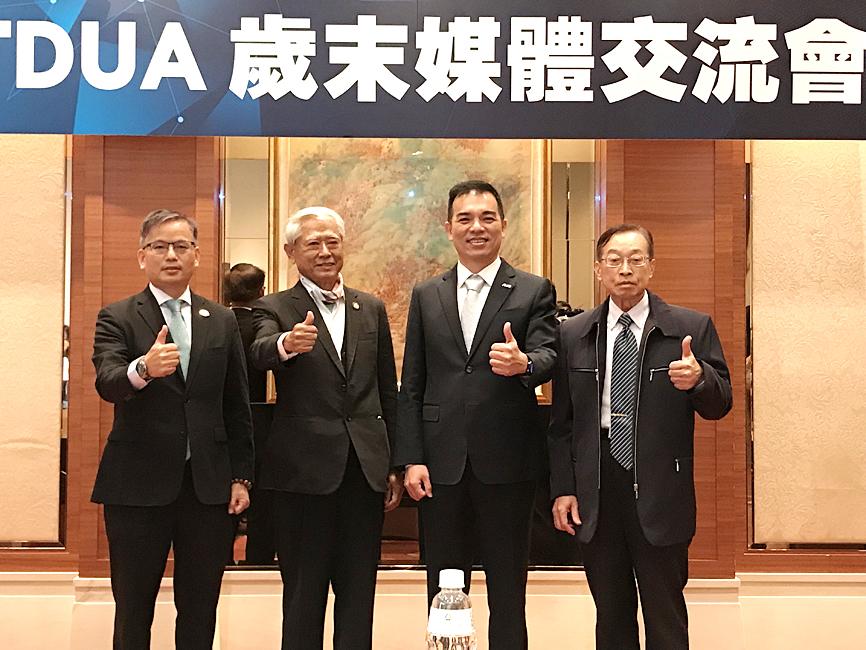AU Optronics Corp’s (AUO, 友達光電) solar module business has been profitable for a second straight year this year, benefiting from growing demand for renewable energy in Taiwan, the LCD panelmaker said yesterday.
The company said that its efforts to transform itself into a provider of comprehensive solar solutions started bearing fruit, adding that its business ranges from supplying solar modules to building and operating its own solar energy plants, as well as helping clients manage their solar power installations.
AUO expects its solar business unit to post more than NT$10 billion (US$360.88 million) in revenue this year.

Photo: Chen Mei-ying, Taipei Times
“Our solar business turned a profit last year. This year will be the second year. We have evolved to be a provider of various solar services,” AUO president Frank Ko (柯富仁) told reporters on the sidelines of a media briefing arranged by the Taiwan Display Union Association (臺灣顯示器產業聯合總會) in Taipei.
“As green energy demand is rising in Taiwan, we launched one-stop-shop services six months ago for landlords or small-scale solar energy developers to pick all sorts of AUO-select components through a platform created by AUO,” said Ko, who is the association’s chairman
AUO is bullish about next year’s solar business outlook, he said.
“We will continue to make profits next year. We have made progress in landing [deals to build] large-scale solar energy plants. Order visibility is clear,” Ko said.
AUO expects its solar energy installations to produce up to 500 megawatts in 2023, more than doubling from more than 200 megawatts this year.
The company installs solar panels on the roofs of factories, above fishing ponds and erects ground-mount solar panels for clients, it said.
Separately, LCD panelmaker Innolux Corp (群創) yesterday said that revenue contracted for a fifth consecutive month last month, as global port congestion and uneven supply of key components and materials affected production.
Some of the company’s Chinese suppliers were forced to halt production due to tightened COVID-19 pandemic controls ahead of the Beijing Winter Olympics, which are to take place in February.
Revenue contracted 0.8 percent to NT$26.59 billion last month, compared with NT$26.8 billion in October, but increased 1.9 percent from NT$26.09 billion in November last year.
“Logistics issues and short supply of components and materials remained the main factors behind the slide,” Innolux president James Yang (楊柱祥) said.
AUO on Wednesday reported a monthly revenue growth of 1.6 percent to NT$30.89 billion last month, compared with NT$30.38 billion in October.
The company attributed the growth to a 3 percent month-on-month increase in panel shipments.

BYPASSING CHINA TARIFFS: In the first five months of this year, Foxconn sent US$4.4bn of iPhones to the US from India, compared with US$3.7bn in the whole of last year Nearly all the iPhones exported by Foxconn Technology Group (富士康科技集團) from India went to the US between March and last month, customs data showed, far above last year’s average of 50 percent and a clear sign of Apple Inc’s efforts to bypass high US tariffs imposed on China. The numbers, being reported by Reuters for the first time, show that Apple has realigned its India exports to almost exclusively serve the US market, when previously the devices were more widely distributed to nations including the Netherlands and the Czech Republic. During March to last month, Foxconn, known as Hon Hai Precision Industry

Taiwan Semiconductor Manufacturing Co (TSMC, 台積電) and the University of Tokyo (UTokyo) yesterday announced the launch of the TSMC-UTokyo Lab to promote advanced semiconductor research, education and talent development. The lab is TSMC’s first laboratory collaboration with a university outside Taiwan, the company said in a statement. The lab would leverage “the extensive knowledge, experience, and creativity” of both institutions, the company said. It is located in the Asano Section of UTokyo’s Hongo, Tokyo, campus and would be managed by UTokyo faculty, guided by directors from UTokyo and TSMC, the company said. TSMC began working with UTokyo in 2019, resulting in 21 research projects,

Ashton Hall’s morning routine involves dunking his head in iced Saratoga Spring Water. For the company that sells the bottled water — Hall’s brand of choice for drinking, brushing his teeth and submerging himself — that is fantastic news. “We’re so thankful to this incredible fitness influencer called Ashton Hall,” Saratoga owner Primo Brands Corp’s CEO Robbert Rietbroek said on an earnings call after Hall’s morning routine video went viral. “He really helped put our brand on the map.” Primo Brands, which was not affiliated with Hall when he made his video, is among the increasing number of companies benefiting from influencer

Quanta Computer Inc (廣達) chairman Barry Lam (林百里) yesterday expressed a downbeat view about the prospects of humanoid robots, given high manufacturing costs and a lack of target customers. Despite rising demand and high expectations for humanoid robots, high research-and-development costs and uncertain profitability remain major concerns, Lam told reporters following the company’s annual shareholders’ meeting in Taoyuan. “Since it seems a bit unworthy to use such high-cost robots to do household chores, I believe robots designed for specific purposes would be more valuable and present a better business opportunity,” Lam said Instead of investing in humanoid robots, Quanta has opted to invest